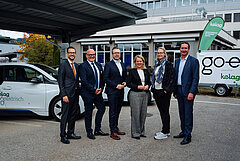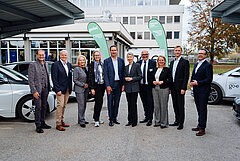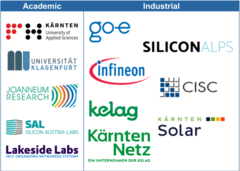Research launch for ‘Shared Charging’ project: Carinthian cooperation aims to advance e-mobility
The Carinthian research cooperation Shared Charging was presented to the public in Villach on 30 October, under the motto of a “Shared Charging Day”.
The project aims to develop a sustainable, cost-efficient and inclusive charging network for electric vehicles. This FFG flagship project, involving 12 Carinthian companies from the fields of technology and science, is one of the largest research initiatives ever brought to Carinthia, with a volume of around 6,4 million euros, via the FFG's ‘Zero Emission Mobility plus’ programme.
Led by go-e, consortium partners from research, science and industry are working together on innovative concepts for the shared use of charging systems that exclusively use renewable energy sources. A pilot plant at the Kelag Energie & Wärme site in Villach will combine state-of-the-art technologies such as PV systems on carports, a battery storage system made from second-life batteries and intelligent charging solutions – thus creating a realistic test environment for the e-mobility of the future.
In addition, demographic and topographical data, e.g. commuter journeys in Carinthia, are incorporated into the Shared Charging project in order to allow well-founded forecasts - possibly transferrable to other countries and regions in Europe-, about how much renewable electricity will be required where for charging electric vehicles in the future.

Shared charging: Focus on technology, sustainability and everyday usability
“Since go-e was founded 10 years ago, our main motivation has been to offer technologically innovative charging solutions that even non-technicians enjoy using and find intuitive,’ explains Erik Yesayan, CEO of go-e. "This concept has made us the market leader in home charging for electric cars in German-speaking countries. With our participation in the Shared Charging project, we want to take the next step and use our expertise to help ensure that everyone has access to a cost-effective, renewable energy-based charging solution for electric cars. Every existing car park should have an environmentally friendly, cost-effective charging connection - that’s the vision," explains Erik Yesayan.
Reinhard Draxler, CEO of Kelag, explained at Shared Charging Day that it is important for Kelag, as an operator of critical infrastructure, to develop and test innovative solutions that will keep the power grid secure and stable in the future at an early stage. ‘The demonstration plant at the Kelag Energie & Wärme site also focuses on bidirectional charging. We are testing how electric vehicles can not only consume electricity, but also feed it back into the grid. In the future, this could help to smooth out peak loads and make optimal use of renewable energy,’ says Reinhard Draxler. Kelag is also supporting the creation of simulation models from a grid perspective as part of the project. Findings from the project are also directly incorporated into the further development of a future-proof and flexible energy system for Carinthia.
As a project partner, Infineon Technologies Austria emphasised the relevance of regional sustainability, in particular the local generation of renewable energies and their targeted use for electromobility. Jörg Eisenschmied, Chief Financial Officer of Infineon Technologies Austria AG: “Our energy-saving chips play a central role in energy management by enabling the entire process of generating, transmitting, storing and using green energy efficiently. The combination of renewable energy and intelligent technology is an unbeatable duo here. In the Shared Charging project, we are contributing our expertise as the global market leader in power electronics to further develop the local e-charging infrastructure and make it easily accessible with strong partners. This demonstrates in concrete terms how our energy-saving chips work. Our research contributes to the achievement of climate targets and strengthens Carinthia as a business location.”
Shared Charging aims to establish a barrier-free, cost-effective and intelligent charging system that dynamically balances energy supply and demand – right where vehicles are parked anyway. “E-mobility is a decisive step towards an independent, affordable and sustainable energy future,” explains Danny Güthlein, CEO of Kelag. “Even today, driving with electricity is cheaper than with diesel or petrol. Those who use their own facilities to generate electricity for charging not only increase their own independence, but also support the overall system through intelligent charging – for the benefit of all. This creates a form of mobility that combines economic efficiency, environmental protection and security of supply. Other countries in Europe show where this development can lead: in Norway, around 94 per cent of all new car registrations are already electric, and a fifth of the vehicle fleet is emission-free. In Carinthia and throughout Austria, we should also resolutely continue along this path and create the right incentives for it.”
Joint project promotes innovative approaches
Interdisciplinary research allows new technologies to be tested in practice more quickly and promotes e-mobility as part of climate-friendly transport. "With the Shared Charging project, we are setting an important milestone for sustainable mobility in the future. By developing an intelligent direct current network and a bidirectional charging infrastructure, we are enabling the efficient integration of renewable energies such as photovoltaics and battery storage in public spaces. We want to show how innovative system concepts for energy distribution can make a real contribution to the energy transition," emphasises Christina Hirschl, Managing Director at Silicon Austria Labs.

Innovation through cooperation
For Deputy Governor Gaby Schaunig, shared charging represents one of Carinthia's strengths: innovation through cooperation. "Research, energy and industry are working hand in hand here to develop intelligent charging and energy systems that make mobility climate-friendly and suitable for everyday use. I am particularly pleased that Silicon Austria Labs, Joanneum Research, Lakeside Labs and the Silicon Alps Cluster are involved, as these are several partners that we as a state have deliberately built up and strengthened here. That was precisely our goal: to create a strong research base in Carinthia that would make large European projects like this one possible. Such collaborations show that Carinthia is not only part of the change, but is actively shaping it – as a European location for living, research and innovation," emphasises Gaby Schaunig.
With the growing number of electric vehicles, the demands on the power grid are also increasing – at the same time, demographic developments are changing the demand for energy and charging infrastructure. Interdisciplinary approaches are needed to meet these complex challenges. This is exactly where the University of Klagenfurt comes in: "At the University of Klagenfurt, researchers from various disciplines have been working on intelligent and efficient technologies for power grids for many years. Their expertise ranges from mathematical optimisation to information technology. The Shared Charging project shows that we need to tackle a challenge as big as the use of renewable energy for charging systems for electric vehicles from many angles in order to find sustainable solutions. The project's systemic approach – with numerous cooperation partners from science and industry – is particularly promising," explains Ada Pellert, Rector of the Alpen-Adria-Universität Klagenfurt.
Carinthia's innovative strength
"The “Shared Charging” research project impressively demonstrates Carinthia's innovative strength and how broadly our province is positioned in the future-oriented fields of sustainable energy, mobility and digitalisation. Projects like this one are flagships. Through the active involvement of our local companies, they secure valuable jobs and create added value in the regions. This strengthens Carinthia as an attractive place to live, work and do business," says Provincial Councillor Sebastian Schuschnig, responsible for energy, economy and mobility.
Participating research partners
The following institutions are conducting research on the FFG project Shared Charging under the consortium leadership of go-e: Alpen Adria University Klagenfurt, CISC Semiconductor GmbH, Carinthian University of Applied Sciences, Infineon Technologies Austria, Joanneum Research, Kärnten Solar, Kelag, Kärnten Netz, Lakeside Labs, Silicon Austria Labs and Silicon Alps. The project is funded by the Climate and Energy Fund of the Austrian Federal Ministry for Innovation, Mobility and Infrastructure.
Consortium:

Image material can be downloaded here.
For inquiries:
Consortium Lead: go-e GmbH
Mag. Elke Galvin
E: presse@go-e.com
T: +43 660 936 06 71
Kelag
Dr. Josef Stocker
E: josef.stocker@kelag.at
T: +43 676 8780 1285